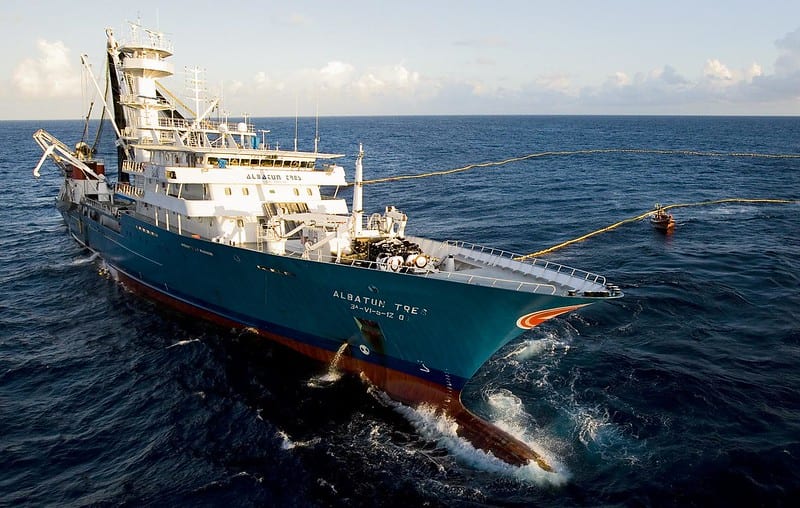Photo: Greenpeace/CC BY-ND 2.0

By Laura Millan Lombrana, Laura Hurst and Jack Wittels (Bloomberg) — Spanish fisherman Josu Bilbao boarded a Qatar Airways flight headed for the Seychelles in January, just as he had done for the past 15 years. Ahead of him, four uninterrupted months of hauling tuna out of the glistening Indian Ocean.
As it turned out, catching the fish was the least of the problems for the 56-year-old captain of Albatun Tres, one of the world’s largest tuna fishing boats. The coronavirus then swept the world, countries shut borders, planes stopped flying and Spain became one of the countries worst hit by the virus.
Bilbao and his crew were stuck. As the Indian Ocean fleet shift was extended ship owners tried to figure out a way to get workers home. Aboard the ship avoiding infection became the priority. Stopping in ports to offload their valuable catch was a hazard and the crew locked themselves away in cabins to avoid any contact with local workers.
Bilbao’s challenges are just one small example of what has the potential to morph into a crisis for the global economy. Hundreds of thousands of crew are finding themselves stuck at sea for far longer than they’d anticipated because of Covid-19. Senior figures in the maritime industry say the situation is unsustainable and could ultimately disrupt world trade that’s already reeling.
Normally, about 100,000 seafarers change ships every month during scheduled port stops, when vessels discharge and pick up freight. The United Nation’s International Maritime Organization estimates that there are about 150,000 people at sea waiting to leave their ships. Secretary-General Kitack Lim said the sector was “on the verge of a humanitarian crisis.”
Inchcape Shipping Services Ltd., which helps with the first and last part of a shipping crew’s journey between vessel and home, said crew transfer jobs effectively disappeared in the end of April though May.
“We’re approaching a tipping point where the effect of our inability to crew change could have a very material impact on world trade,” Chris Crookall, the chief commercial officer at Inchcape, said in an interview.
The company, which helps to facilitate about 5% of physical seaborne trade, is now seeing a rise in the movement of crew around the world, but activity is still about 30% below normal levels.
Complex Hoops
The Spanish fishing fleet, the largest in the European Union, successfully completed its first change of shift in tuna fishing boats in the Indian Ocean in May.
Getting the fishermen back to the families involved a complex series of hoops to jump through. They included paying for charter flights, engaging with governments in Spain and the Seychelles and making sure the fishermen never spent more than two hours on the islands at any one time.
Boats usually touch port in the Seychelles once a month to refuel and unload the catch. Fishermen use these few hours to walk on land or go to restaurants. That all stopped under coronavirus. When the crew were locked in their cabins the local workers unloaded the haul, and the entire boat was disinfected after.
It was just as convoluted ensuring the replacement crew got to the Seychelles safely. The local authorities wanted every single fisherman tested for Covid-19. When the shift swap did eventually happen instead of the usual hugs and conversations with the replacements, Bilbao saw his colleagues and friends through a bus window.
Corona choppers
It’s not just trying to get people off ships after months’-long stints that’s a headache. Offshore oil platforms where workers spend up to 3 weeks at a time in close confinement, miles from shore are particularly vulnerable.
A coronavirus outbreak on a Petroleos Mexicanos offshore oil platform shows how quickly things can get out of control. At least 74 workers and 2 contractors have died from the virus, with 8 dying in one single day. Oil companies elsewhere are implementing measures to avoid that scenario.
Royal Dutch Shell Plc has upgraded medical facilities offshore to better test and handle suspected cases of Covid-19. When needed, North Sea workers are flown onshore in dedicated helicopters nicknamed “corona choppers.”
Inchcape’s Crookall said that along with stringent personal hygiene requirements for crew transfers they now have to liaise with customers to ensure transport used adheres to social distancing and that vehicles are cleaned between each job.
Because most seafarers undergo 14-day quarantines before joining a ship, crews at sea are now most likely to catch the infection from port workers such as ship inspectors and vessel operators, rather than colleagues, says Helen Kelly, spokeswoman for shipping trade union Nautilus International.
The union, together with the International Transport Workers Federation and the UN’s International Labour Organization have given governments until June 16 to implement safe crew-change protocols.
“Governments that fail to comply may find that ships officers and crew who have worked beyond their contractual obligations refuse to continue working,” Kelly said. “If enough decide on this course of action, world trade could grind to a halt very quickly.”
–With assistance from William Mathis.
© 2019 Bloomberg L.P

 Join The Club
Join The Club











